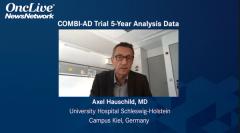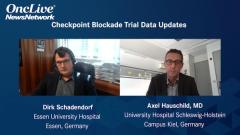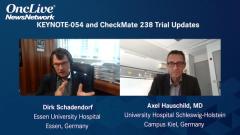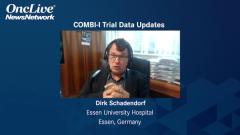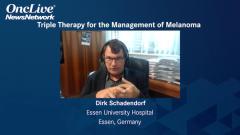
Checkpoint Blockade Trial Data Updates
Episodes in this series

Transcript:
Dirk Schadendorf, MD: We’ll move for a short period now to checkpoint blockade and the role of checkpoint blockade in stage III disease, preventing disease progression. We have seen at ASCO [American Society of Clinical Oncology Annual Meeting] but also at ESMO [European Society for Medical Oncology Congress] some updates on the KEYNOTE-054 study, which is a registration study for pembrolizumab in stage III disease, as well as CheckMate 238. Is that changing anything? What is new? Maybe you can briefly summarize what we have seen, and in the subsequent question we will try to elucidate whether this is changing anything in our view on adjuvant treatment.
Axel Hauschild, MD:Yes, you’re right. First, there is only 1 trial comparable to COMBI-AD. It was not exactly the same but very much the same eligibility criteria. This is the KEYNOTE-O54 study on pembrolizumab. This clinical trial is less mature because the data are a year and a half behind COMBI-AD in the follow-up. The 4-year data were presented by Alex Eggermont in an entertaining way, as always. What happened is that the 4-year data for the patients who are BRAF mutated look very much the same, almost on the point to the 4-year data of the COMBI-AD study, so there is no sign that the targeted therapies are inferior to immune checkpoint blockade.
Dirk Schadendorf, MD: Let’s stop here because that’s a very important statement, comparing both studies, with all the caveats of comparing clinical studies. There is actually, in terms of clinical efficacy, no doubt that when they are treating patients in stage III with targeted therapy or a checkpoint inhibitor, the clinical benefit for the patient seems to be up to year 4, landmark 4, the same. What else makes you decide checkpoint blockade or targeted therapy?
Axel Hauschild, MD:This is the most burning question for all of us these days. I would say it’s only the adverse events, and an oral drug works as an infusion. So it’s the adverse events.
Dirk Schadendorf, MD: Probably.
Axel Hauschild, MD: Mainly are reversible after BRAF and MEK inhibitors, whereas there are some rare irreversible adverse events, particularly caused by autoimmunity, by the immune checkpoint inhibitors. Therefore, if I have the choice in a stage IIIA patient with relatively low tumor burden, I would favor in a patient with BRAF mutation, dabrafenib-trametinib. For stage IIID, I would also say that dabrafenib-trametinib is in favor because if you compare the long-term data, they look better for the targeted therapies because there’s a very high risk of an explosion of the metastasis in this very unfortunate patient group, called stage IIID now. Therefore, for all the others I would leave it open. This is 90% of all patients nowadays.
Dirk Schadendorf, MD: All right. There was another interesting piece of datum which we were given as part of the KEYNOTE-054 update. It was not only the report of the 4-year landmark for relapse-free survival, but there was a surrogate marker presented: distant metastasis-free survival. Do you want to comment on that as well?
Axel Hauschild, MD:Distant metastasis-free survival in the past was a very good surrogate marker for overall survival, but in our days it may not be the same because it is pulling the development of distant metastasis, which is stage IV in melanoma and may contribute to the overall survival 1 day. Therefore, the data are very good. Again, in the same ballpark as for COMBI-AD, so I would say very good data. It’s very likely that we can cure a proportion of patients with stage III melanoma by an adjuvant treatment, and the goal for me in person is to cure patients, not only to prolong disease-free or distant metastases-free survival.
Dirk Schadendorf, MD: That’s an interesting statement, Axel, because indeed, as part of your answer—it was hidden—in the past distant metastases-free survival was considered a possible surrogate for overall survival with 2 or 3 years of delay showing the same result. That has been shown, actually, in the previous ipilimumab adjuvant trial conducted 8 or 9 years ago by the EORTC [European Organisation for the Research and Treatment of Cancer], which led to the approval of high-dose ipilimumab in the United States. There we see it. Actually a very similar pattern is also seen with the KEYNOTE-054 study, where we see a hazard ratio for distant metastases-free survival that is clearly statistically significant between placebo and the treatment arm, which was pembrolizumab. Why do you believe this is not true anymore? This is based on the overall survival data, which we have seen work for CheckMate 238.
Transcript Edited for Clarity


